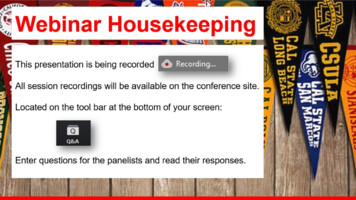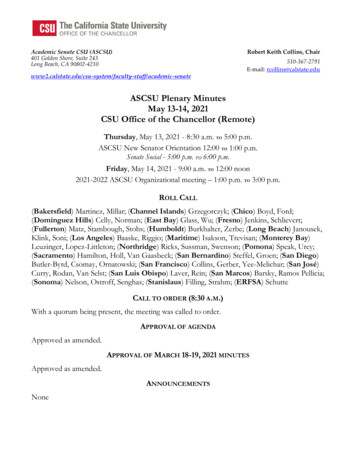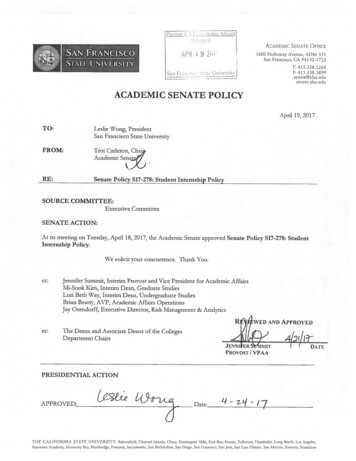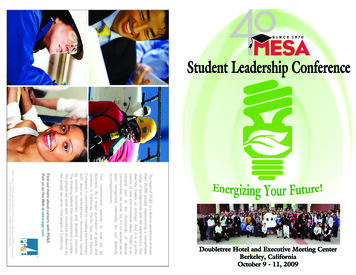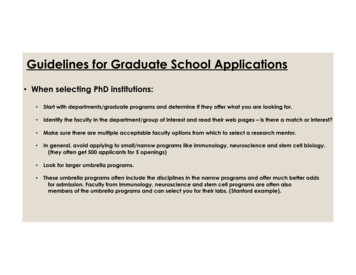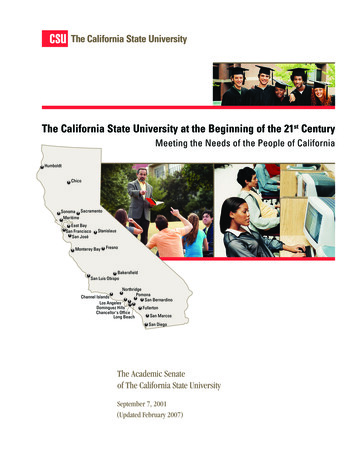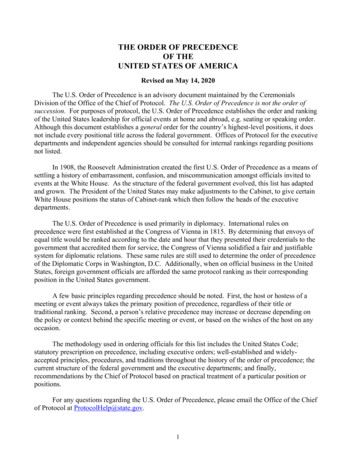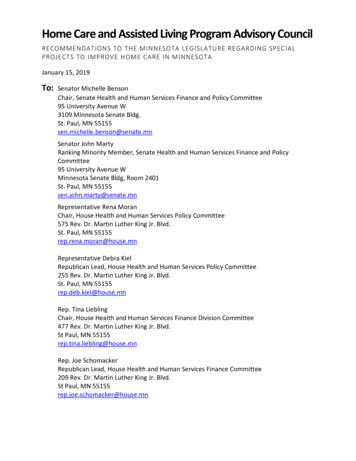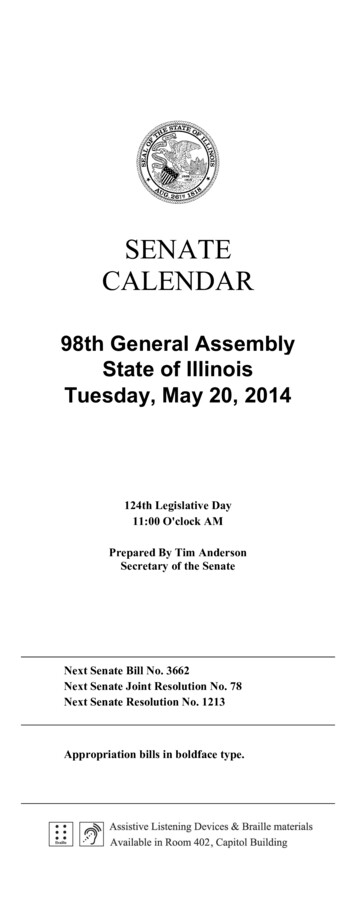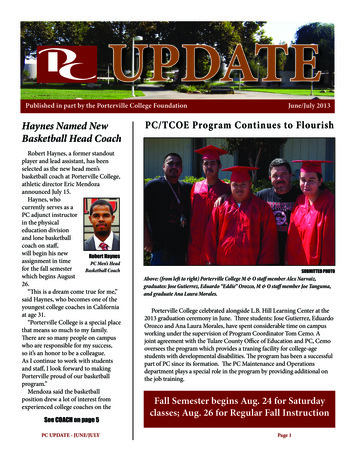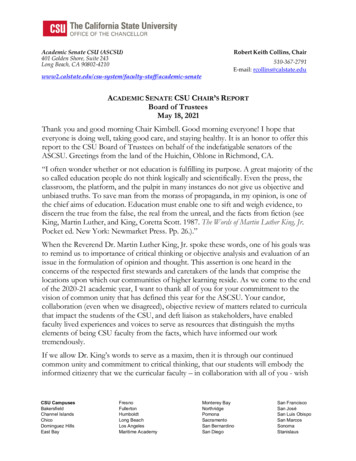
Transcription
Academic Senate CSU (ASCSU)401 Golden Shore, Suite 243Long Beach, CA ff/academic-senateRobert Keith Collins, Chair510-367-2791E-mail: rcollins@calstate.eduACADEMIC SENATE CSU CHAIR’S REPORTBoard of TrusteesMay 18, 2021Thank you and good morning Chair Kimbell. Good morning everyone! I hope thateveryone is doing well, taking good care, and staying healthy. It is an honor to offer thisreport to the CSU Board of Trustees on behalf of the indefatigable senators of theASCSU. Greetings from the land of the Huichin, Ohlone in Richmond, CA.“I often wonder whether or not education is fulfilling its purpose. A great majority of theso called education people do not think logically and scientifically. Even the press, theclassroom, the platform, and the pulpit in many instances do not give us objective andunbiased truths. To save man from the morass of propaganda, in my opinion, is one ofthe chief aims of education. Education must enable one to sift and weigh evidence, todiscern the true from the false, the real from the unreal, and the facts from fiction (seeKing, Martin Luther, and King, Coretta Scott. 1987. The Words of Martin Luther King, Jr.Pocket ed. New York: Newmarket Press. Pp. 26.).”When the Reverend Dr. Martin Luther King, Jr. spoke these words, one of his goals wasto remind us to importance of critical thinking or objective analysis and evaluation of anissue in the formulation of opinion and thought. This assertion is one heard in theconcerns of the respected first stewards and caretakers of the lands that comprise thelocations upon which our communities of higher learning reside. As we come to the endof the 2020-21 academic year, I want to thank all of you for your commitment to thevision of common unity that has defined this year for the ASCSU. Your candor,collaboration (even when we disagreed), objective review of matters related to curriculathat impact the students of the CSU, and deft liaison as stakeholders, have enabledfaculty lived experiences and voices to serve as resources that distinguish the mythselements of being CSU faculty from the facts, which have informed our worktremendously.If we allow Dr. King’s words to serve as a maxim, then it is through our continuedcommon unity and commitment to critical thinking, that our students will embody theinformed citizenry that we the curricular faculty – in collaboration with all of you - wishCSU CampusesBakersfieldChannel IslandsChicoDominguez HillsEast BayFresnoFullertonHumboldtLong BeachLos AngelesMaritime AcademyMonterey BayNorthridgePomonaSacramentoSan BernardinoSan DiegoSan FranciscoSan JoséSan Luis ObispoSan MarcosSonomaStanislaus
to create, and we can continue to enable the CSU community, and State of California andbeyond, to cultivate the practice of challenging fictions with facts, and let all know thateducation is a vehicle for allowing all to be and enabling all within society to belong.It is in this spirit of belonging that I offer my last report as the 2020-2021 Chair of theASCSU. Two practices that have continued to shape our approach to promotingcommon unity are effective communication and advocating for faculty success and howit enables student success. These efforts have included, but were not limited to thefollowing:ACTIVITIES AND MEETINGSPreceding our May 13-14, 2021 plenary, the ASCSU Fiscal and Governmental Affairs(FGA) Committee engaged in rigorous legislative advocacy. Although current FGAefforts seem to be contributing to collective CSU efforts to obtain a positive budget, thecommittee remains concerned about “AB 928: Student Transfer Achievement ReformAct of 2021: Associate Degree for Transfer Intersegmental Implementation Committee.”Central in this legislation would be an oversight and policy recommending committeewith only three faculty representatives from all three segments: California CommunityColleges (CCC), California State University (CSU), and University of California (U.C.), asingular lower division general education pathways used to determine eligibility to theCSU and U.C. by 2023-24, and a common numbering system in the CCC. It is importantto note that this legislation is opposed by the faculty of all three segments. This legislativeintrusion is considered problematic for the following reasons:1. Limited intersegmental faculty representation on the proposed body and input indiscussions of college preparedness.2. Redundancy in curricular discussions, as the Intersegmental Committee ofAcademic Senates (ICAS) is a group of Academic Senate leaders from each of thethree segments of public higher education in California. It meets jointly toaddress matters of academic importance to all three segments. Central in thesediscussions for the past decade is transfer efficiency. It is important to note thatthis decade initially began with much funding for faculty to meet on this processfrom many of the same entities sponsoring this legislation.3. Given the lack of constitutional autonomy for some segments and lack of Prop98 funds for others, the burden – in theory - will fall on the CSU faculty in termsof implementation.It is important to note, that the faculty of all three segments are committed to improvingtransfer efficiency; however, we all agree, as per our April meeting, that transfer is notbroken. It is underfunded, particularly in the area of advising. Consider the followingscenario evident in the current practices of all three segments. If I and my sister werestudents at Contra Costa College, and I followed the Intersegmental General EducationTransfer Curriculum (IGETC) pathway, because I was not sure whether I wanted to go2
to the CSU or U.C., then upon completion of the pathway, I could apply to the either theCSU or U.C. and be considered. My chances for admission would improve if I obtainedan Associate’s Degree for Transfer (ADT) in Ethnic Studies in the process. What kind ofbarriers would I face? The first would be a limited 30 minutes of academic advising at myCCC, which I may use more for mental health concerns during a pandemic thanacademic advising. As discussed at ICAS, most CCC students use this time for mentalhealth advising. I then would complete my pathway, with limited guidance as to what toexpect from the CSU and U.C. in terms of college preparedness and how the twoinstitutions were different. Fortunately, I get in to U.C. Berkeley and my sister gets intoCal State East Bay. Upon arrival, we both hear from our professors that we are notprepared. Me lacking in a level of statistics that would have aided my success inanthropology at CAL, while my sister should have taken another writing class for successin psychology at CSU East Bay. Are our shortcomings the fault of too much G.E.curriculum or limited advising? While some of you may think that this scenario isfictitious, it is important to know that the experiences, people, and schools are real,except, I did not go to Contra Costa like my sister. If these experiences occurred whenthere was funding, then should we be surprised by the barriers students face today,created by limited funding of advising?As the outgoing Chair of ICAS, which will rotate to UC Senate Chair Horowitz nextyear, my goals is to maintain open dialogue with the legislators behind AB 928. ICAS willbe speaking with these and other legislators and their staff at our June 1, 2021 meeting. Itis my sincere hope that common ground can be found so that we do not furtherexacerbate barriers to transfer that we seek to remedy.During our May 13-14, 2021 plenary, the Academic Senate engaged in another robustagenda, comprising twelve resolutions. Eight were approved in second reading and fourwere approved that appeared in first reading with a waiver request. Those approvedincluded, but were not limited to the following:1. AS-3478-21/APEP (Rev)Concerns About Common Transfer Pathways Across the CCC, CSU, and UC(Regarding AB 928 Berman- Student Transfer Achievement Reform Act Of2021: Associate Degree for Transfer Intersegmental Committee)ApprovedThis resolution recommends that interest in transfer pathways be operationalized asadditional support for existing CSU/CCC-driven joint efforts on student preparationand transfer rather than proposing new such structures3
2. AS-3480-21/FA (Rev)Recognizing the Disparate Impact of the COVID-19 Pandemic on Women inthe CSUApprovedThis resolution notes that women (particularly women of color) have sufferednegative professional and financial outcomes because of the COVID-19 pandemicand asks the Chancellor’s Office is asked to create a statewide CSU task force toexamine the short- and long-term effects of the COVID-19 pandemic on the careerprogression of women in the CSU.3. AS-3481-21/APEP (Rev)Concerns About Dual Admission LegislationApprovedThe resolution recommends that the Legislature provide additional funds for existingCSU/CCC-driven joint efforts on student preparation and transfer rather thanproposing new such structures. ASCSU recommend that the CSU and the CCCcontinue to work together within existing intersegmental structures to ensure that thepreparation for transfer from the CCC to the CSU is both appropriate in content andstructure and that the requirements are clear to our potential future students4. AS-3482-21/AA (Rev)Faculty and Administrative Responses to Student Transgressions of AcademicIntegrityApprovedThe resolution encourages campus senates to adopt policies that better informstudents of existing university and campus policies on academic integrity.5. AS-3483-21/FA (Rev)Reimbursement for COVID- Related Work-at-Home ExpensesApprovedThis resolution acknowledges that many faculty and staff have paid for COVIDrelated work-at-home expenses out of their own pockets (e.g., computer equipment,internet access, and office supplies, etc.) and urges the CSU to providereimbursement for expenses incurred by faculty and staff.6. AS-3484-21/APEP (Rev)CSU Support for Expanded Early -Start Summer ExperiencesApprovedASCSU urge the Office of the Chancellor (CO) to ensure adequate funding tosupport the sustainability and growth of these campus-based programs.4
7. AS-3485-21/FGA (Rev)Support for Actions Taken to Reduce Climate Change and to Protect theEnvironmentApprovedThis resolution recommends that California Public Employees’ Retirement System(CalPERS) develop and implement a strategic plan to divest from corporations whichdo not commit to carbon neutrality consistent with Governor Brown’s ExecutiveOrder B-55-18;8. AS-3486-21/APEP (Rev)Concerns Regarding Ethnic Studies and IGETC ImplementationApprovedThis resolution encourages the alignment of Intersegmental General EducationTransfer Curriculum (IGETC) with the CSU General Education area F requirements(Ethnic Studies) when considering changes to IGETC.9. AS-3473-21/EXAcademic Senate of the CSU Calendar of 2021-2022 MeetingsApprovedTHE FOLLOWING RESOLUTIONS WERE INTRODUCED IN FIRST READING WITHWAIVER:1. AS-3490-21/FAIncreasing Funding to the Academic Senate of the CSUThis resolution urges the Chancellor’s Office and the Board of Trustees to recognizethe hard work, and time investment required for service as an ASCSU Senator and thevalue added to the CSU by the ASCSU, with increased funding.2. AS-3491-21/AAFaculty Involvement in Reimagining Higher Education, Post-LockdownThis resolution strongly encourages campuses to revisit issues of instructionalmodality, campus culture, campus presence, and community engagement as part ofthe long-term adjustment of campus-reopening in a post-lockdown environment.In closing, on May 14, 2021, the ASCSU held elections for the 2021-22 ASCSUExecutive Committee Officers. The results are as follows, in reverse order of processand the new Executive Committee will transition in as of June 1, 2021:At-Large Senator #2: Dr. David Speak, Political Science (Cal Poly Pomona)At-Large Senator #1: Dr. Nola Butler-Bryd, Counseling and Psychological Services (SanDiego State University)5
Secretary: Dr. Thomas Norman, Management and Marketing (Dominguez Hills)Vice Chair: Dr. Beth Steffel, Design (Cal State San Bernardino)Chair: Dr. Robert Keith Collins, American Indians Studies, College of Ethnic Studies(San Francisco State University)Thank you Chair Kimbell, this concludes my final report for the 2020-2021 academicyear. It has truly been an honor to serve as the 2020-21 ASCSU Chair. On behalf of theASCSU, a special thanks to Chair Kimbell and Trustees Khames, Raynes, Simon, andMcGrory and Faculty Trustee Sabalius for your visits this year and thought provokingconversations. I thank you all for your attention and time and I am happy to answer anyquestions that you all may have.Respectfully submitted,Robert Keith Collins, PhD6
ASCSU. Greetings from the land of the Huichin, Ohlone in Richmond, CA. "I often wonder whether or not education is fulfilling its purpose. A great majority of the so called education people do not think logically and scientifically. Even the press, the classroom, the platform, and the pulpit in many instances do not give us objective and
